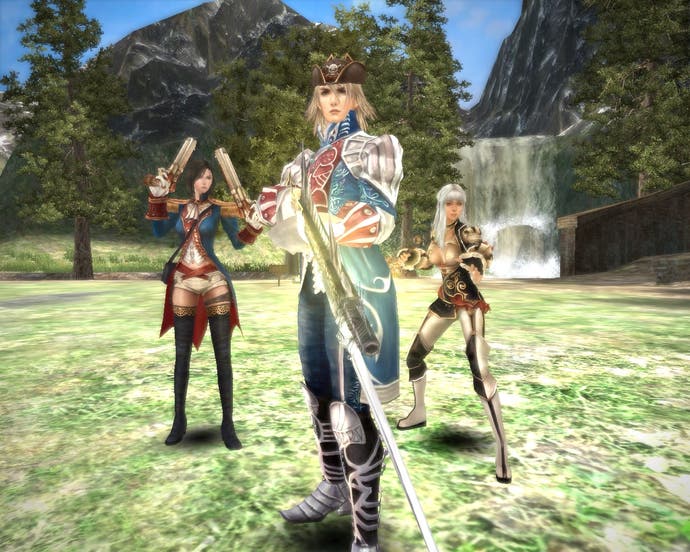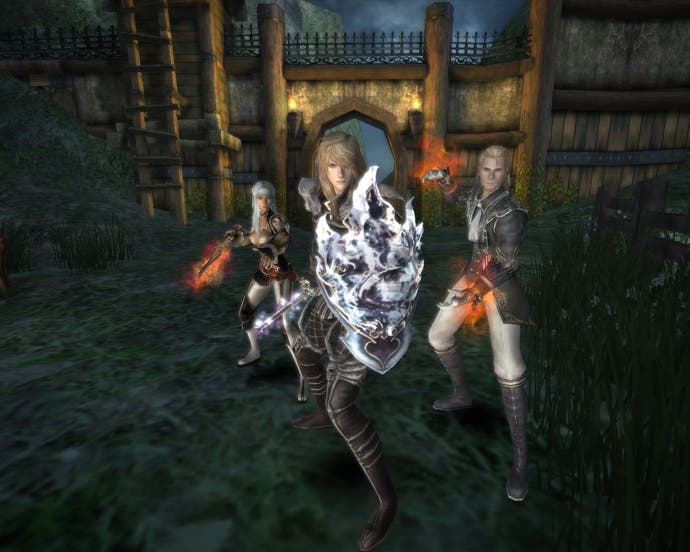Sword of the New World
Very shiny and unusual, as swords go.
As a child brought up with a good old-fashioned Catholic education, one of my fondest memories of school is of a harassed teacher desperately attempting to explain the concept of the Holy Trinity to a class of confused, bored and surprisingly cynical ten-year-olds. It all just sounded so awkward, having three aspects to one divine being; practical concerns were raised involving such matters as privacy when going to the toilet (also a common theme when the question of omnipotence was addressed shortly afterwards) or remembering who was meant to be doing what. Having one body per being, our ten year old minds reasoned, simply made a lot more sense, and that was that.
In retrospect, acting as a ringleader in such matters probably explained why I was never popular with religion teachers at any point in my ill-fated academic career.
I was reminded of this pivotal moment in my education when the mechanism by which a Holy Trinity might work was finally explained to me, over a decade and a half later, by the helpful chaps behind upcoming MMORPG Sword of the New World. In hindsight, it's all so obvious; if you have three aspects to one persona, all you really need is direct control of one of them, a good system for giving orders to the others, and some shortcut keys for quick commands you need to fire off in the heat of battle (or, I don't know, miracle-doing). If only they'd explained it so simply at school!
Flagrant blasphemy which would have my long-suffering primary school teachers reaching for the smelling salts aside, Sword of the New World is a massively multiplayer game with a twist - a proper twist, mind, none of your "it's World of Warcraft but with differently named stuff!" nonsense. This twist, as you've probably gathered, is that you don't play as a single character; instead, you control a mini-party of three characters throughout the game.
Enough to pique your interest? It should be, because the change which this makes to the basic minute to minute gameplay is massive; and we're only just getting our heads around the difference it will make to the social dynamics of the whole thing.
An MMORPG with an actual, honest to god difference from anything else on the market; will wonders never cease?
Just the Three of Us

When you first load up Sword of the New World (or Granado Espada, as it was known in Korea and is now subtitled in the west), you are presented with your "Barracks" - an opulent room decorated in a 17th century Baroque style, around which the various characters you have created lounge, stand, sit or generally bum about. As you click on the characters you want to bring with you today, they straighten up and walk forwards to wait in front of you; you can pick any three characters you like to join your party, or create a new one if you so desire.
In game terms, the characters populating your barracks are the "Family" you control; they all share a surname, and are essentially a big clan of adventurers, heroes, mavericks, warriors and the what have you, from which you choose three party members each time you start the game. This is a game in which having loads of different characters will be practically a requirement - and the family concept is extended throughout the game, with even one of the core PvP elements being the idea of rivalries which develop between clans, and escalate into wars.
Once you're dropped into the world, you essentially control one of the characters directly, and the other two run around behind you. It's the same system which is used in console titles like Final Fantasy XII, so it will be immediately familiar to many players - and the party system brings with it a few other elements of those console RPGs which turn well-established conventions of the fantasy MMOG on their head.

First, and most obviously; this spells an end to the countless hours most MMOG fans have spent looking for a Healer class to join their party so that they can take on a dungeon or boss. Instead, you just pop your own healer into your party, and off you go; there are five base classes, so in fact a party of just two players can have one of each with a slot to spare, and even one player alone will be able to manage a tank, a healer and a damage dealer or support class.
Secondly, because you are controlling all three characters at once, there's an element of AI involved in the control of player characters which would be almost unthinkable in other MMOGs - but seems to work perfectly well in Sword of the New World. While you always have the option of direct control over all of your characters, and there are shortcuts to the key attacks, spells and so on at your fingertips for all three, in many cases you'll be happy just to, for example, leave your healer (called a "Scout" in Sword of the New World parlance) on a competent auto-heal setting, and focus on pulling things and retaining enemy focus with your tank character.
If that all seems a bit complex or fiddly, then don't worry; according to the team behind the game, the way you use the interface scales really well with your level of competence. Just as your interface in World of Warcraft grows all manner of buttons, bars and ding-dongs as you progress in the game, Sword of the New World is designed so that new players can focus on one character for movement and largely just set the others up to act automatically - but later in the game you'll find it useful to position characters individually, and exercise a larger degree of control over what they're all doing.

